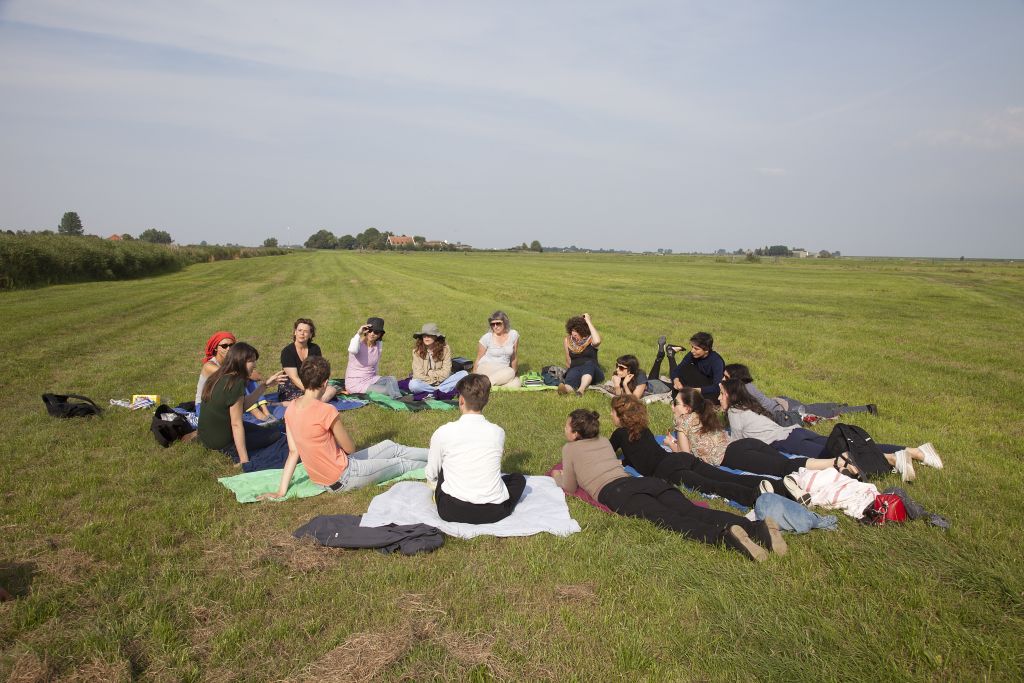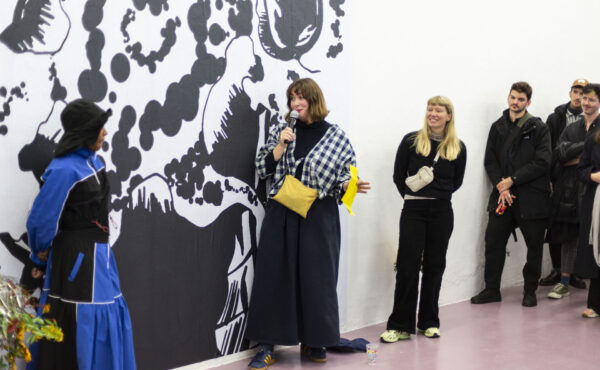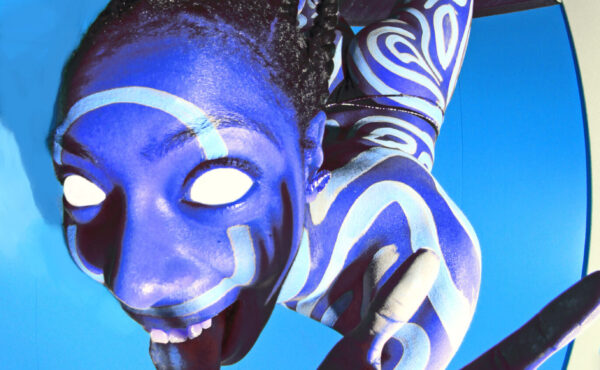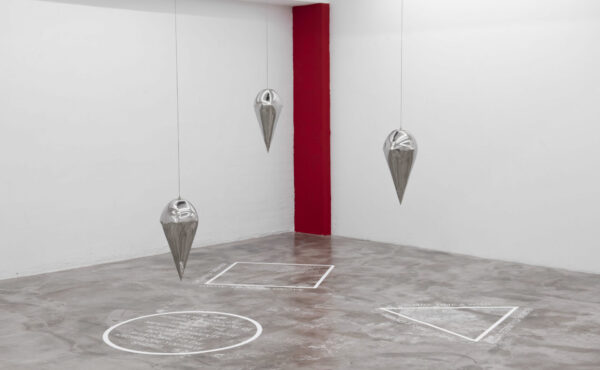
The Reading Group

Curator Susan Gibbs talks about the amazing popularity of the Reading Group. More specifically the reading groups (and resulting publications) of If I Can’t Dance. On the value of collective knowledge and in depth research.
Could you tell us something about the beginning of this initiative that has led to several reading groups in different countries which has resulted in at least three publications? It started as a local reading group, which at a certain moment became international?
The three publications have emerged from If I Can’t Dance, I Don’t Want To Be Part Of Your Revolution’s ongoing Reading Group, which began in 2006 as part of its second biannual programme, Edition II – Feminist Legacies and Potentials in Contemporary Art Practice (2006—2008). Within this framework, the Reading Group was initiated by two of If I Can’t Dance’s founders—the curators Frédérique Bergholtz and Annie Fletcher—as a response to what they felt was, at the time, a lack of infrastructure in contemporary art for the development of, and engagement with, research and discourse. It was also an experimental project for them through which they hoped to further develop the theoretical framework for the artistic projects that If I Can’t Dance was commissioning and producing. More specifically, the field of research for that particular Edition, Feminist Legacies and Potentials in Contemporary Art Practice, intensified their feelings. The various positions and generational shifts within feminist literature and political practice acted as a call to Bergholtz and Fletcher to think of a way that they could find their own co-ordinates within the breadth of feminist discourse. In light of this, the structure of a reading group—with its promotion of agency through self-learning and collective thinking—appeared as a suitably fitting practice for the task. Since then, the Reading Group has grown into an integral part of If I Can’t Dance’s structure and rhythm of life, with it providing a permanent space for research and theoretical debate within the organization. The Reading Group takes place monthly at its Amsterdam offices, and often texts that have been read in the course of day-to-day curatorial research end up as material presented for discussion within the Reading Group, or vice-versa, texts suggested by the group become topics of curatorial conversation later on. Over the years, the Reading Group has also come to reflect the mobile nature and international reach of If I Can’t Dance’s programme. Having operated without a fixed stage for presentation since its inception, If I Can’t Dance’s has developed through its very enactment, at each event, and each location, over time. This structure has seen If I Can’t Dance present extensively throughout the Netherlands, Europe and the Americas, and engage with artists located both here in the Netherlands and further afield internationally. In response to this mobility we have established a network of Sister Reading Groups which are hosted by practitioners and institutions we have collaborated with in cities around the world, and which expand and contract in relation to the programme that we are working on. For example, one of the first Sister Reading Groups was hosted in Bilbao, and complimented a sustained partnership with the art space Sala Rekalde, who presented all of the artist commissions of Edition III – Masquerade (2009—2010), during an important moment of their development. In a similar manner, Site Gallery in Sheffield hosted a Sister Reading Group to continue the dialogue around ‘Affect’ that we had commenced together when If I Can’t Dance curated an arts festival in the city, Life: A User’s Manual (2010). At present three curators in three different cities host the Sister Reading Groups: Kelly Kivland in New York, Daniela Castro in São Paulo, and Jacob Korczynski in Toronto. For us the Sister Reading Groups are very important as they bring a depth of meaning to If I Can’t Dance’s movement and international activity, exemplify our commitment to providing time to the practitioners and locations with which we engage, and allow alternative perspectives, voices, and unexpected links to enter the organization. They also embody our conviction that any understanding of performance requires a geographically, culturally and politically diverse reading of theory and practice, alongside the importance of a de-centralization of knowledge. Through this exchange the Sister Reading Groups also feed the development of our programmes, and create a consistent point of contact for many of the international artists and researchers with who we are and have worked with. For example, in the current programme, Edition VI – Event and Duration (2015-2016), we are working with the poet and scholar Fred Moten who we were introduced to through the New York Reading Group; the philosopher Peter Pál Pelbart and Ueinzz Theatre Company who work in São Paulo; and the curator Erin Alexa Freedman and artist Lili Huston-Heterich who are doing a research project around the landmark 1983 Toronto exhibition, Chromaliving: New Designs for Living, and were introduced to us by Jacob Korczynski.
Is it by invitation only? Or can everyone join in?
The monthly Reading Group is open to anyone who is interested in joining, though we generally ask for people to provide a short letter of motivation for doing so. This is because across the years we have realized that there is a certain depth and openness that comes from reading and thinking together with a committed group of people, at regular intervals, over a sustained period of time. But while this is an ideal, in reality the Reading Group is a very open and informal entity, and includes both long-term members that have been reading with us since the group was established, newer attendees and guests on visit to Amsterdam. To complement the monthly Reading Group, and as a way to extend its access to a wider public, and open it up to new and more experimental ways of reading, we have also held an Open Reading Group as part of each programme since 2013. The Open Reading Group sees If I Can’t Dance invite an artist to lead a daylong session of reading in a selected location in Amsterdam, and is open for anyone who wishes to attend to join. The first Open Reading Group was initiated and led by the artist Alex Martinis Roe—who is now also one of our commissioned artists for Edition VI—and involved a bike ride to Holysloot in the north of Amsterdam. Against this countryside backdrop, Alex Martinis Roe led the group through ideas of voicing, feminism and gendered vocality using readings of the Italian philosopher Adriana Cavarero, and practices of the Milan Women’s Bookstore Collective. For our current Edition VI, the Open Reading Group was led by the artist Valentina Desideri and philosopher Denise Ferreira da Silva, and began with a reading of Ferreira da Silva’s text, Art as Confrontation (2015) at the If I Can’t Dance’s offices. This was followed by the group cycling to a park in the Bijlmer, where Desideri and Ferreira da Silva concluded the day by leading the group through alternative methods of reading, including tarot—through which the groups dynamics and multiple interpretations of Ferreira da Silva’s text were collectively read—and reiki—which opened the group up to new ways of thinking through their senses—and which together were illuminating for how they opened up ways of reading things outside of the written word. We have also recently started a monthly Dancing Group as a pendant to the Reading Group, and which extends such approaches to reading through an investment in the knowledge inherent in the physicality of the body and its social movement.
Who is deciding on the main topics to be discussed?
Together the Reading Groups operate as a collective enquiry into the field of research that circumscribe each of If I Can’t Dance’s editions. So far the fields of research have included Masquerade, Affect, Appropriation and Dedication and currently, Event and Duration. And while the curatorial team in Amsterdam sets these fields of research, each of the Reading Groups are invited to take this as a starting point to depart from, and are encouraged to respond by finding their own trajectory of reading through it. In this way the topics and readings to be discussed, and the forms that each session takes, respond to the character of the locality, and the interests of the members comprising each Reading Groups’ constituency. For example, during the edition on Appropriation and Dedication, the group in São Paulo decided to focus on a close reading of Slavoj Žižek’s book, The Sublime Object Of Ideology (1989), returning to the text across numerous meetings. Later they also used the Reading Group as a temporary self-education project around the occupation of Parque Augusta, a pressing local issue that spoke to corporate appropriation of public space in the city. Meanwhile the group in Toronto moved around to different locations in the city from month to month, and became quite performative in their approach, including the group reading aloud the essay Variations on the Right to Remain Silent by the poet Anne Carson around a cob fire pit in a local park, and enacting text scores by the American composer, educator, and musician Pauline Oliveros. On a monthly basis, each Reading Group also shares with each other what they are planning to read, and after the session follow this up with a short report, so that collectively we have a sense of the conversations and ideas that are emerging in each location. Throughout the year we also catch up regularly for group conversations over Skype—despite the challenges of the time difference—and use this as an opportunity to discuss what is being read by each group, how the texts are being selected and received, and as a general way to catch up on key events and cultural news from each context. From these lines of communications, it is not uncommon for something that was read by one group to come to inspire another, and later end up on the list of one of the Reading Groups elsewhere.
Why Masquerade and the other issues at this moment?
The above-mentioned fields of research are tied together by If I Can’t Dance’s ongoing interest in the typology of performance and performativity in contemporary art. This sustained interest in performance is what drives all of If I Can’t Dance’s activities, with each field of research providing us with a new way to approach performance as it occurs both in theory and practice, in history and the contemporary moment. It is also often from the Reading Groups, and through the material that is shared and the discussions that they stimulate, that we are often directed to the idea for the next field of research. In this way there is a symbiotic relationship between the Reading Group and our ongoing curatorial research. For example, the idea for Edition III – Masquerade emerged when reading Judith Butler’s Performative Acts and Gender Constitution and Joan Riviere’s Womanliness as Masquerade within the Reading Groups around our Edition II – Feminist Legacies and Potentials in Contemporary Art Practices. And following this, the idea of ‘Appropriation and Dedication’ for Edition V emerged out of a rereading of the work of appropriation artist Louise Lawler through the lens of affect, as considered in texts by both Helen Molesworth and Isabelle Graw, during Edition IV – Affect.
At a certain moment you decided to collect crucial texts in a reader. Also adding research from other projects by If I Can’t Dance. Isn’t it?
We often refer to the Reading Group as the backbone of If I Can’t Dance, and as such the Reader’s could be thought of as part of this nervous system—perhaps as If I Can’t Dance’s institutional memory. For If I Can’t Dance, the idea of the Reader emerged to house its thinking over a certain period of time, around a certain field of research, and to provide a constant point of reference for this into the future. Most importantly, they also make it possible for wider audiences to access the work of If I Can’t Dance, particularly as we don’t have a permanent space that can be visited. The Readers fulfill this function. It should also be mentioned that the Readers are designed by Joris Kritis and Julie Peeters, who have done a great job formulating a template for the project, with each Reader comprising a graphic cover image designed in response to the field of research, facsimiles of selected readings, as well as a complete agenda of If I Can’t Dance’s activities across the two years that each book encapsulates. In terms of the Readers content, alongside the selected readings—which traverse performance studies, art history, gender studies, anthropology, sociology, postcolonial studies, literary studies, philosophy and artists writing, to name a few—various texts are also commissioned to complement these. These are most commonly written by members of the Reading Groups, and serve as a reflection on our reading process, a translation of our dialogical approach to the subject matter, and to provide visibility to the various voices at play across the groups. On other occasions these texts are commissioned in relations to our discursive activities, including self-organized seminars and symposia, and in relation to the Master programmes we teach with in the Netherlands, including most notable the Dutch Art Institute. For the Readers we have also started to commission artist pages from artist members within the Reading Groups. So far these have included Matthew Lutz-Kinoy, who produced photos and watercolours for Reading/Feeling, and Christian Nyampeta who produced a series of prints for Rereading Appropriation.
Could you describe these books as the product of a truly collective editing process? How does that differ from ‘normal’ editing, Can you give an example what was put forward by group dynamics that would not have happened in a more regular editing process?
The Readers come together after the fact, rather than before commencing the sessions. This makes them atypical to readers produced for example in academic study. In this way the texts in each book have a subjective element, reflecting the interests and suggestions of the constituents of each Reading Group as the reading goes along. The excitement of the Readers is what happens when all of these voices are brought together—its idiosyncratic and anachronistic—as it is not trying to be an authority on a subject.
In the introduction to the book Rereading Appropriation, The Milan Women’s Bookstore Collective is mentioned. That gives the suggestion there might also be a political agenda behind this initiative? Or in other words: are you working hard to rewrite history?
The Milan Women’s Bookstore Collective was introduced to the Reading Groups on two occasions, including by the artist Alex Martinis Roe during the Summer Open Reading Group in Amsterdam in 2013, and then in Toronto by one of the groups members, Corinn Gerber, who wrote a text for multiple voices based on the Collective’s ideas. A consideration of the Milan Women’s Bookstore Collective, and their political practice of affidamento—a socio-symbolic practice based on the reciprocal relationship of entrustment between two adult women—resonated deeply with the practices of the If I Can’t Dance Reading Groups, and the relations it has fostered between its constituent members within each location, and with each of the Sister Groups at a larger scale. With this in mind, it is probably not surprising that If I Can’t Dance takes its name from a (mis)quote by the famous feminist activist, Emma Goldman, nor that an interest in feminism has been an ongoing red thread through all that we do. A critical reconsideration of history is central to feminist thought and practice, and these ideas are something If I Can’t Dance has adopted as a mode of being. Such is represented both structurally through If I Can’t Dance’s alternative proposition of what an arts institution can be, and through our programming—such as the Reading Group—that seeks to engage in critical dialogues between the past and the present, and the formation of subject positions, to consider the potential futures we are all participating in the construction of. Perhaps it is apt to end with words of Annie Fletcher and the artist Sarah Pierce, taken from their text The Paraeducation Department (2005), which has formed a guide to the operation of the Reading Group since its inception, and perhaps best explains these politics: “In the spirit of an open-ended discussion: There is no audience. We do not need to ‘perform’ this reading group. You do not need to speak from a fixed position. You are not here as a representative of anything or anyone else. Say anything … This is all about making the u-turns needed to discover common points of reference.”
More information on the readers and the reading groups of If I Can’t Dance
A SHORTER DUTCH TRANSLATION OF THIS TEXT WAS PUBLISHED IN METROPOLIS M No 3-2016 AFTER 80s. DO YOU WANT TO RECEIVE THIS ISSUE? MAIL [email protected]
Domeniek Ruyters


